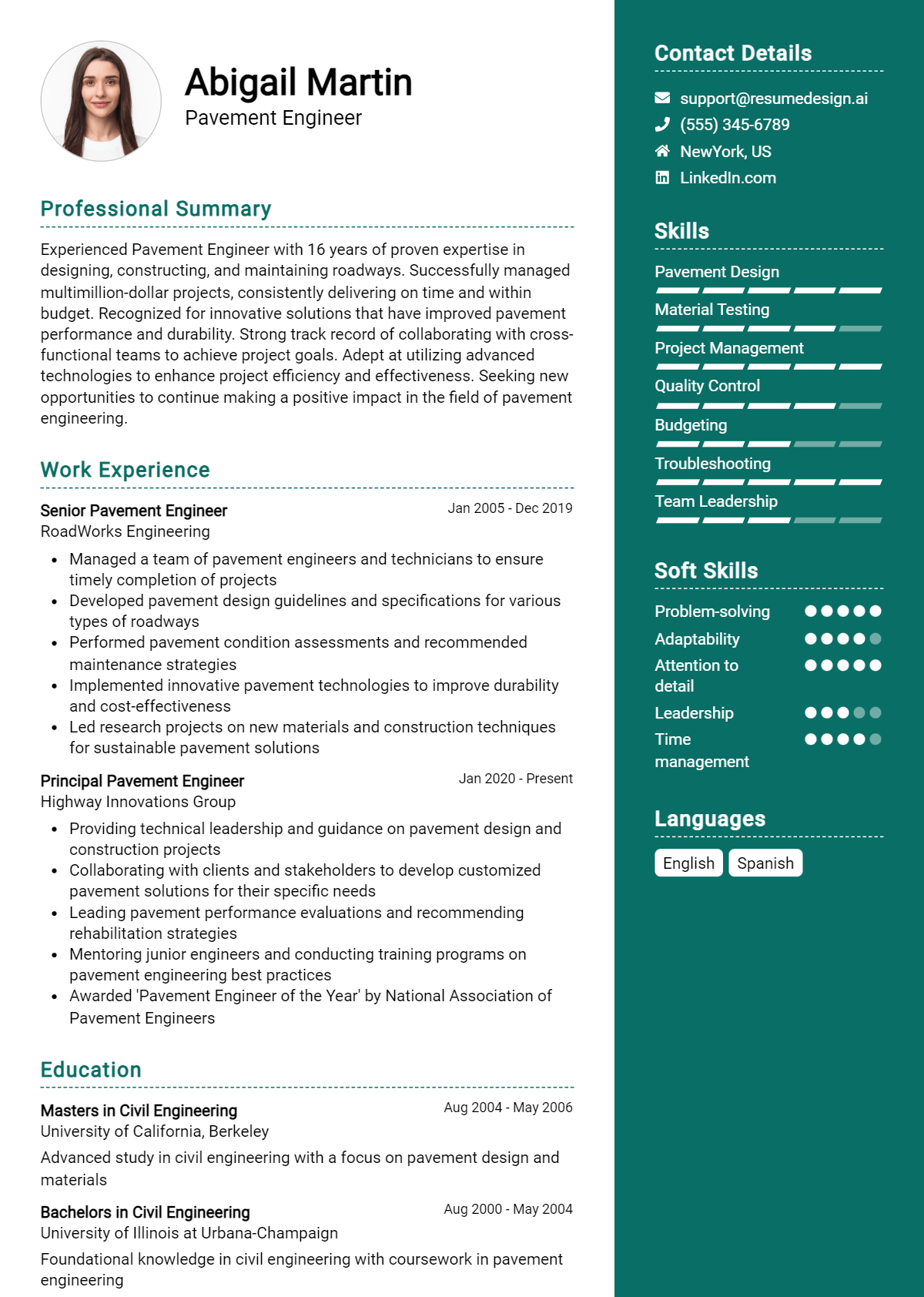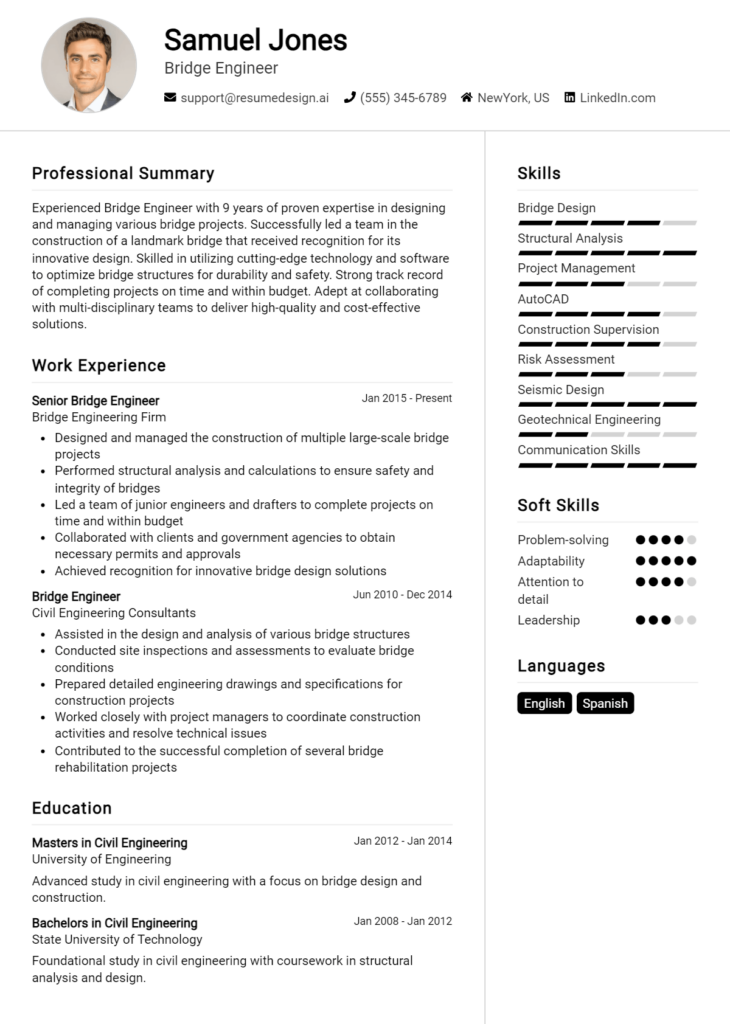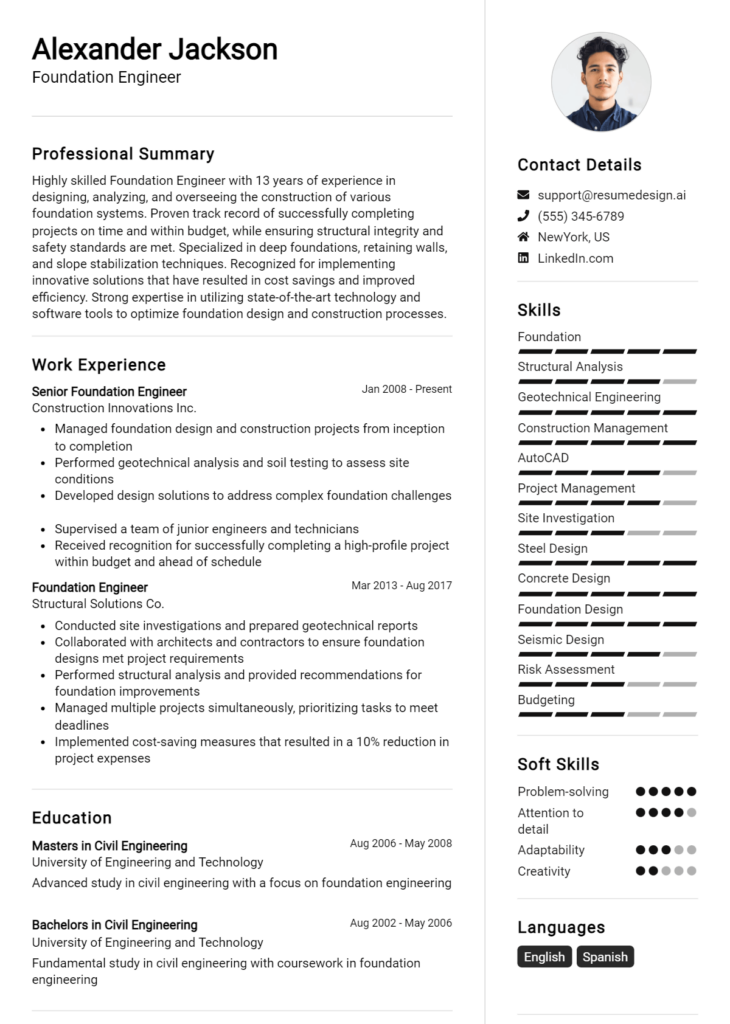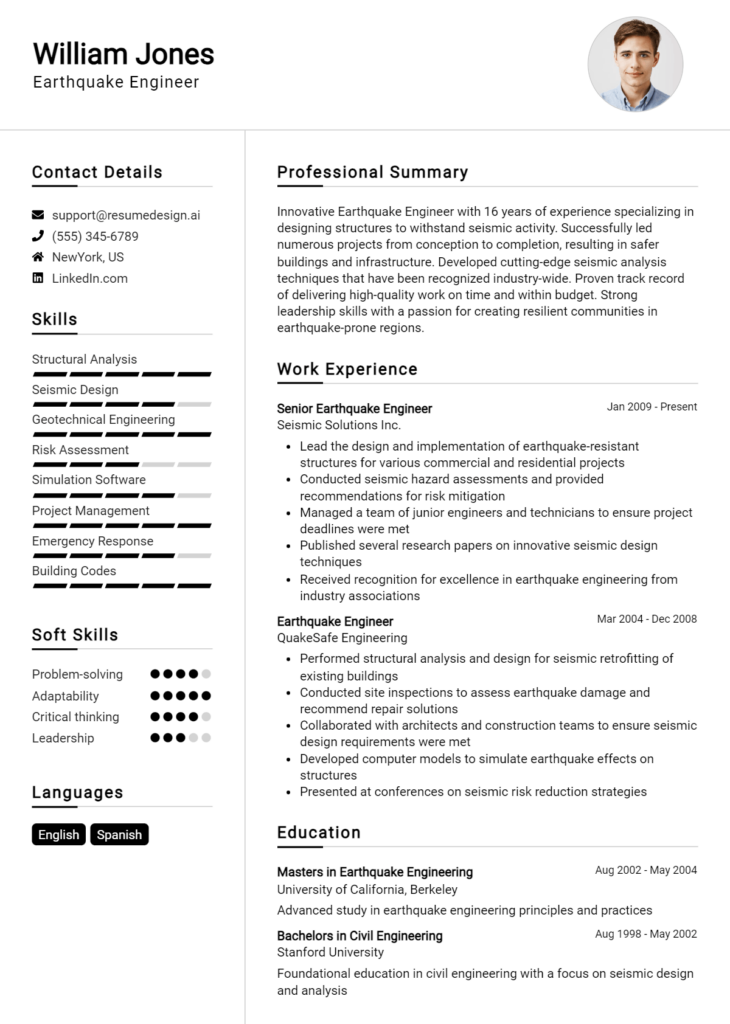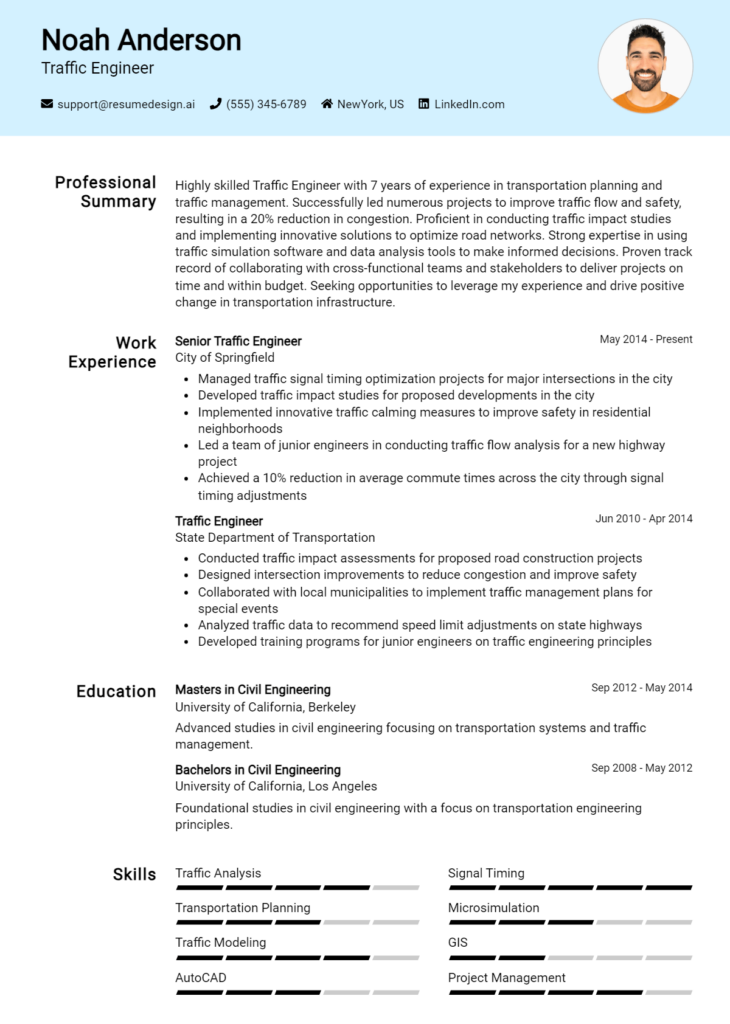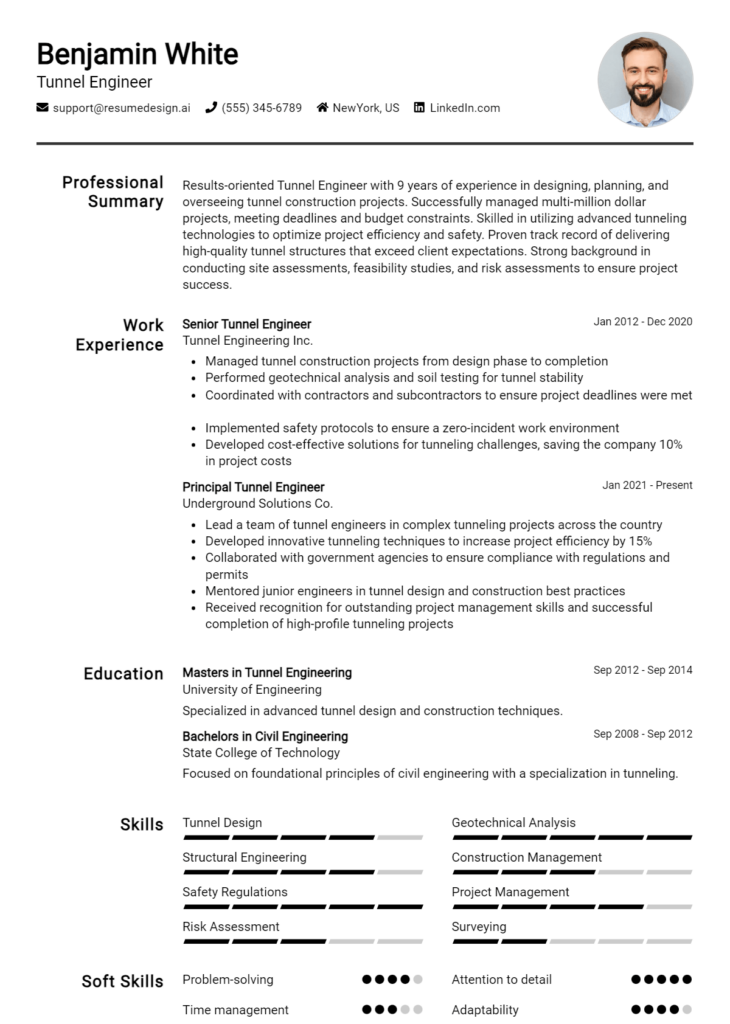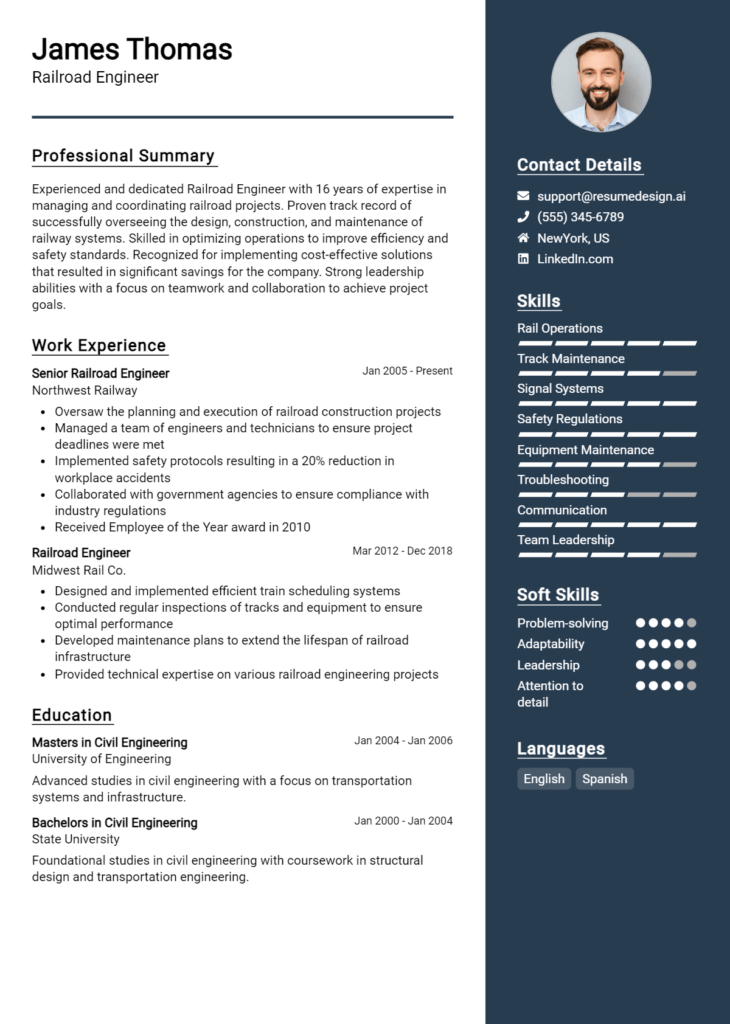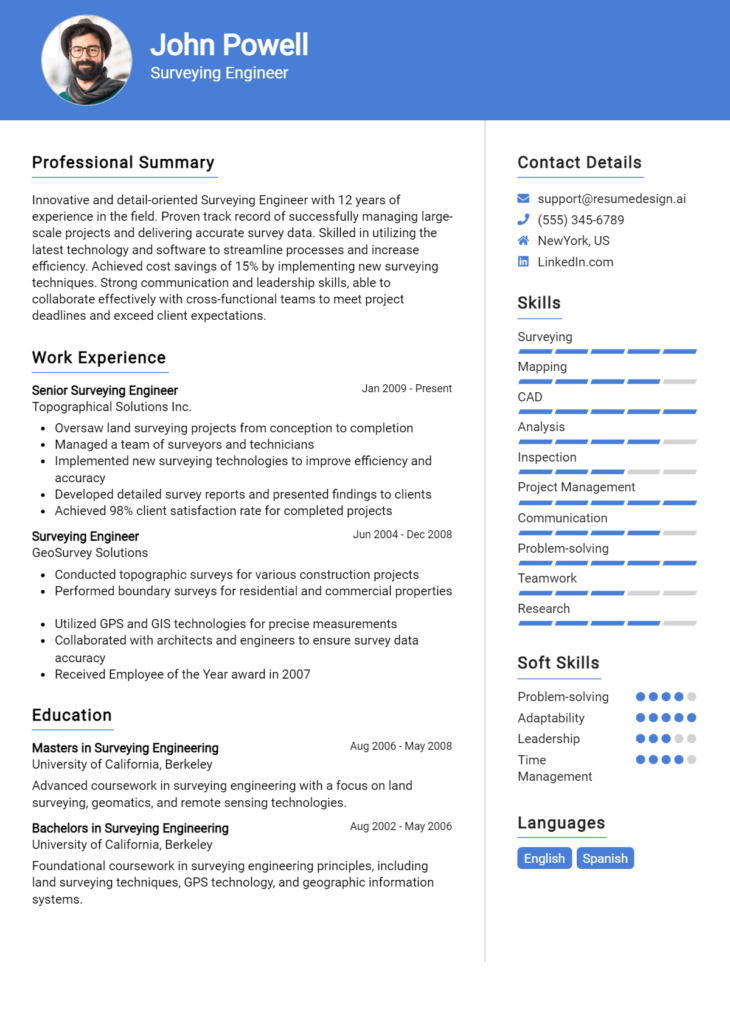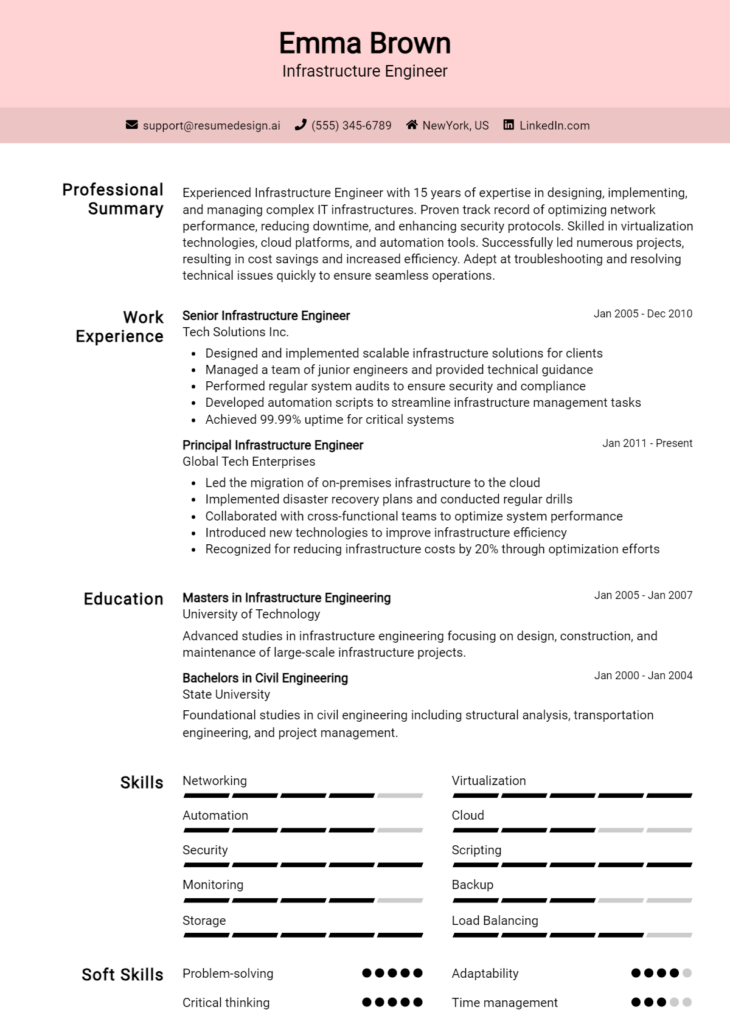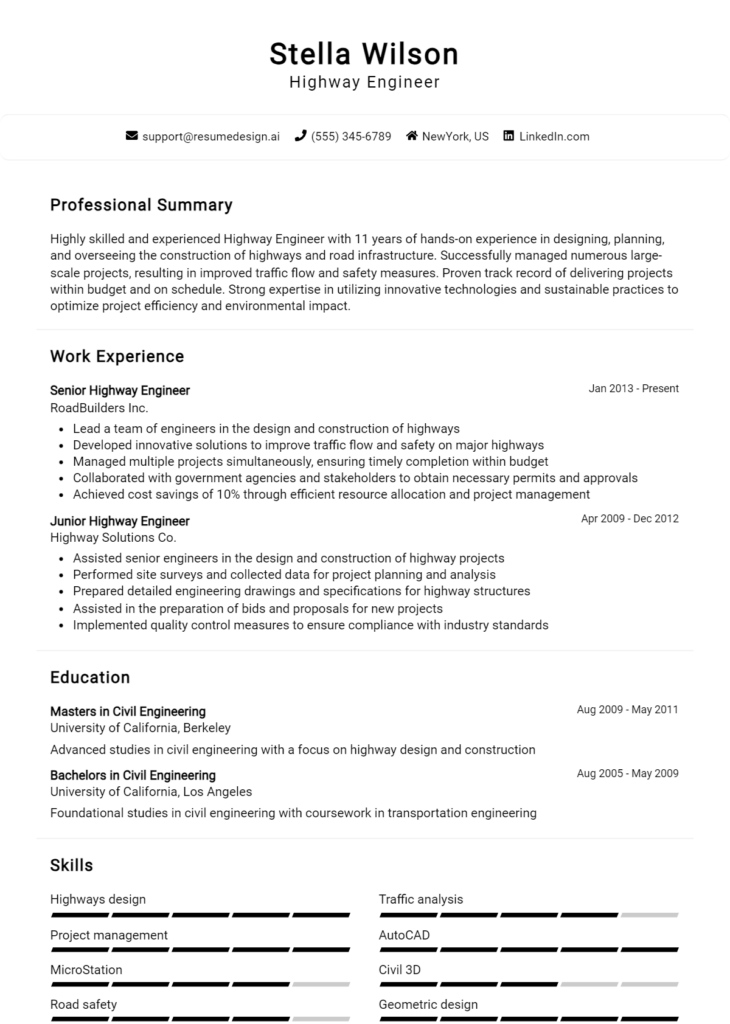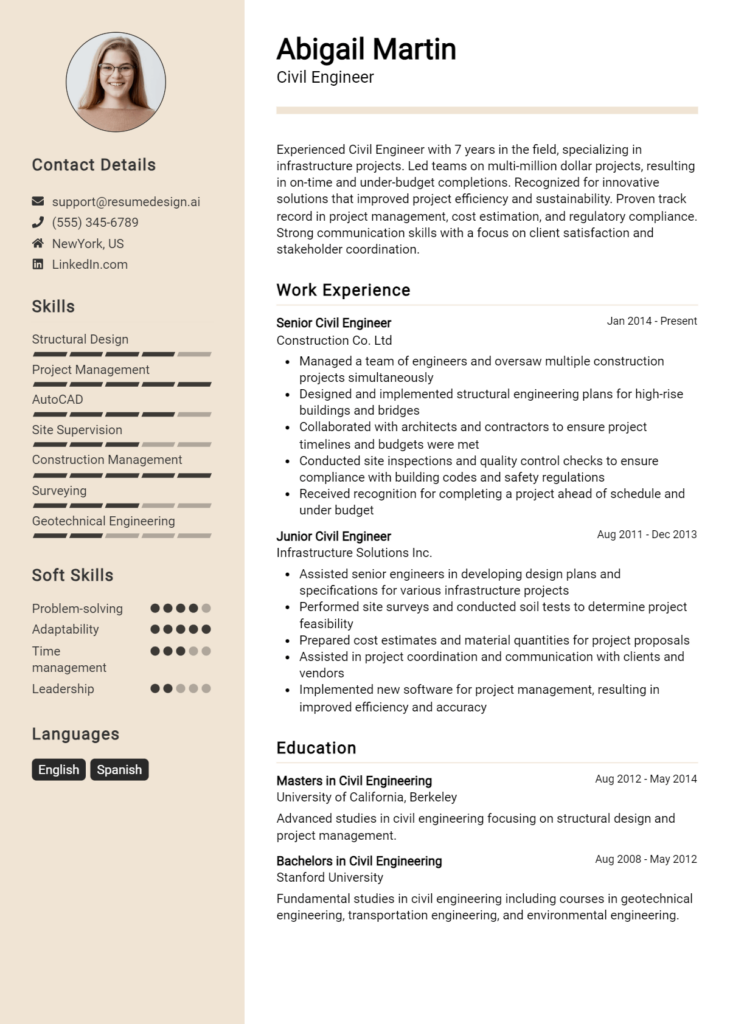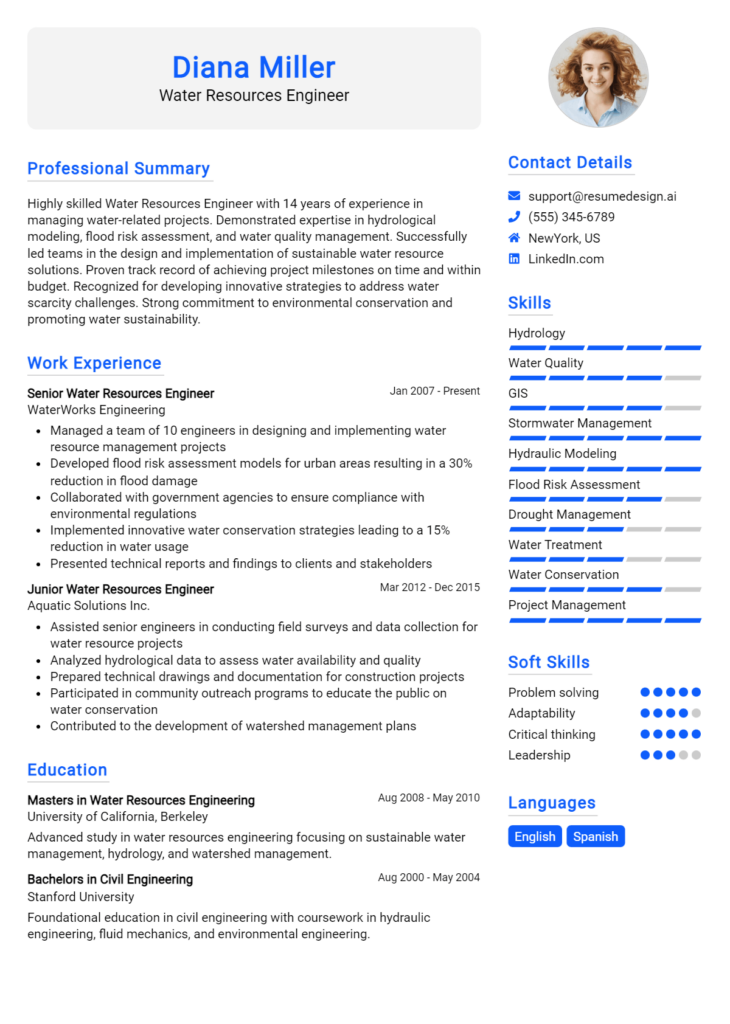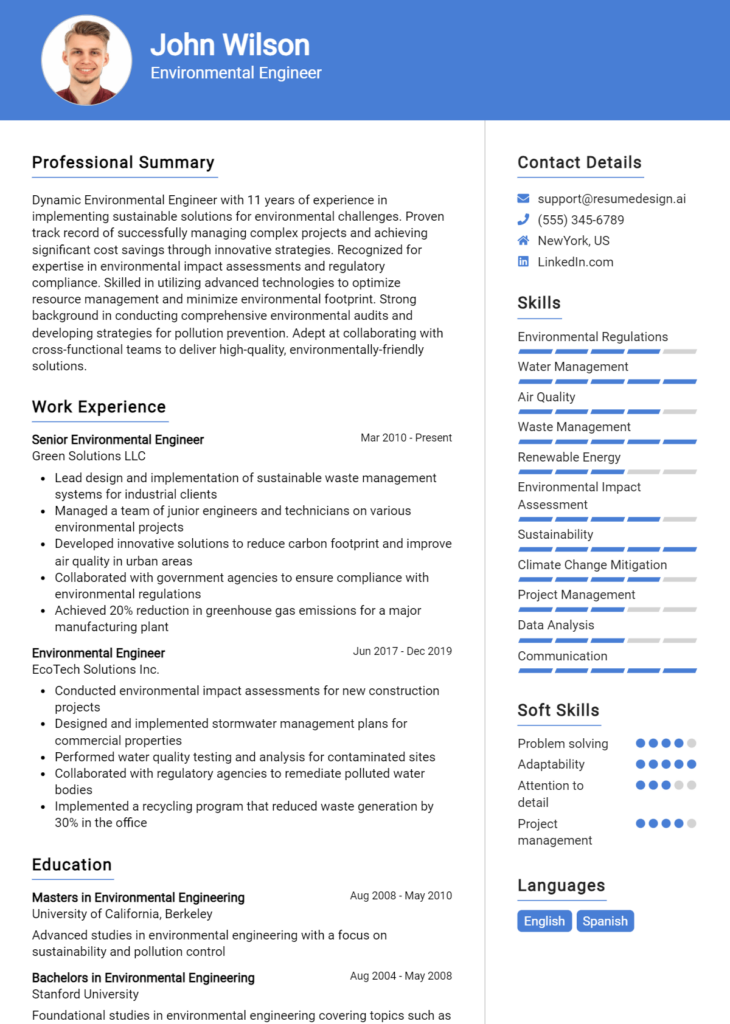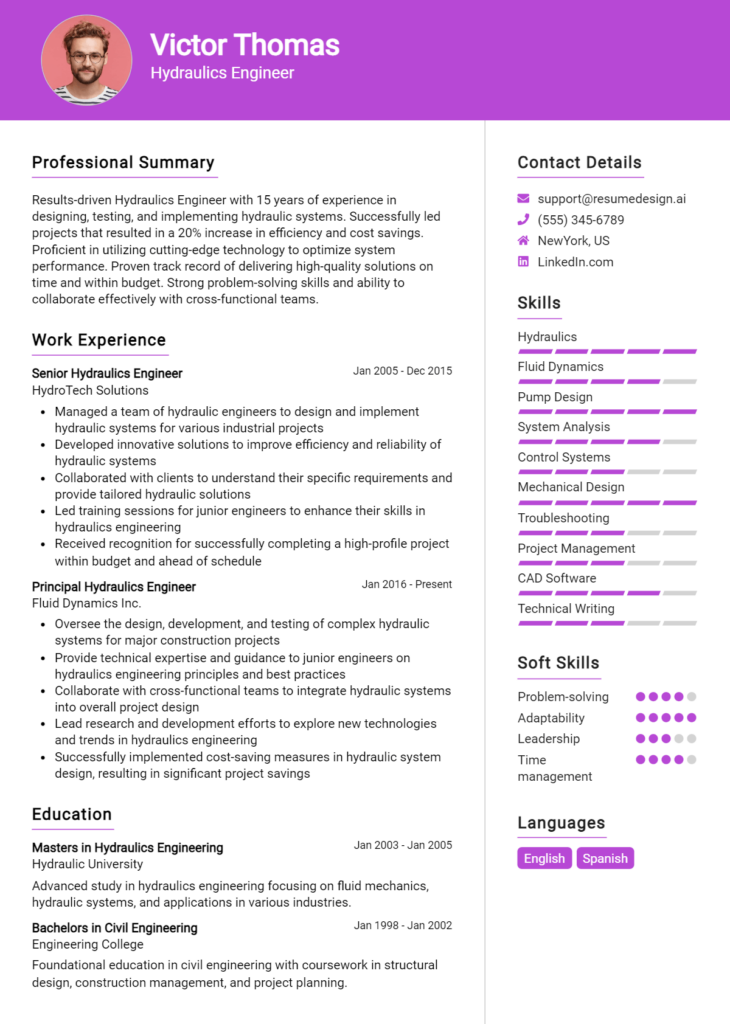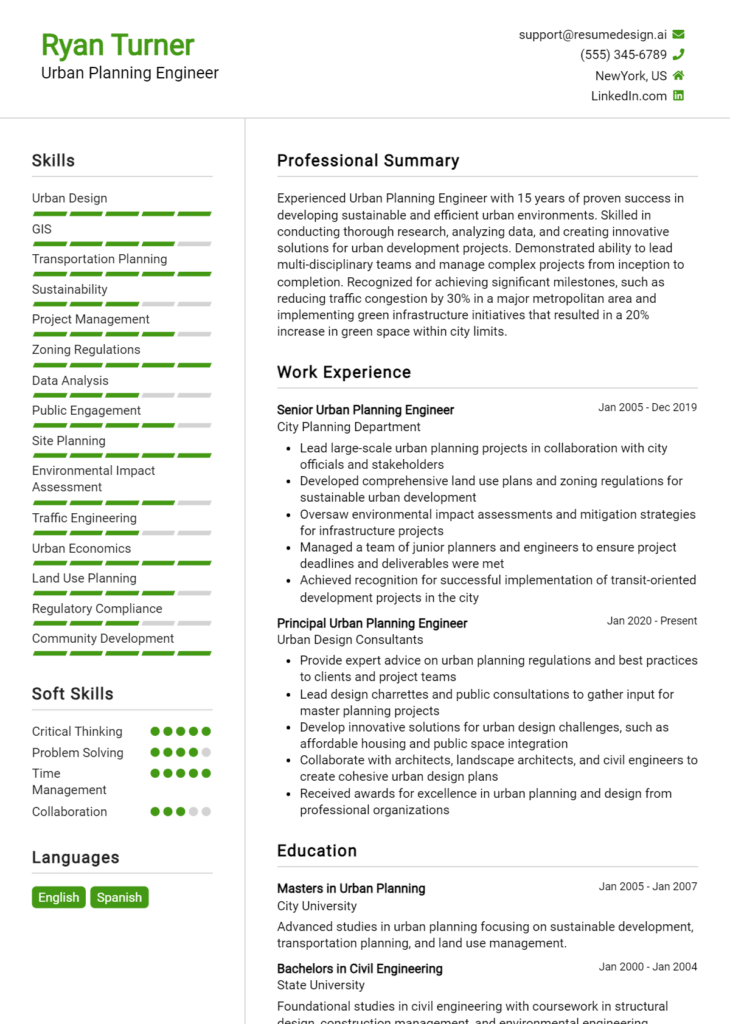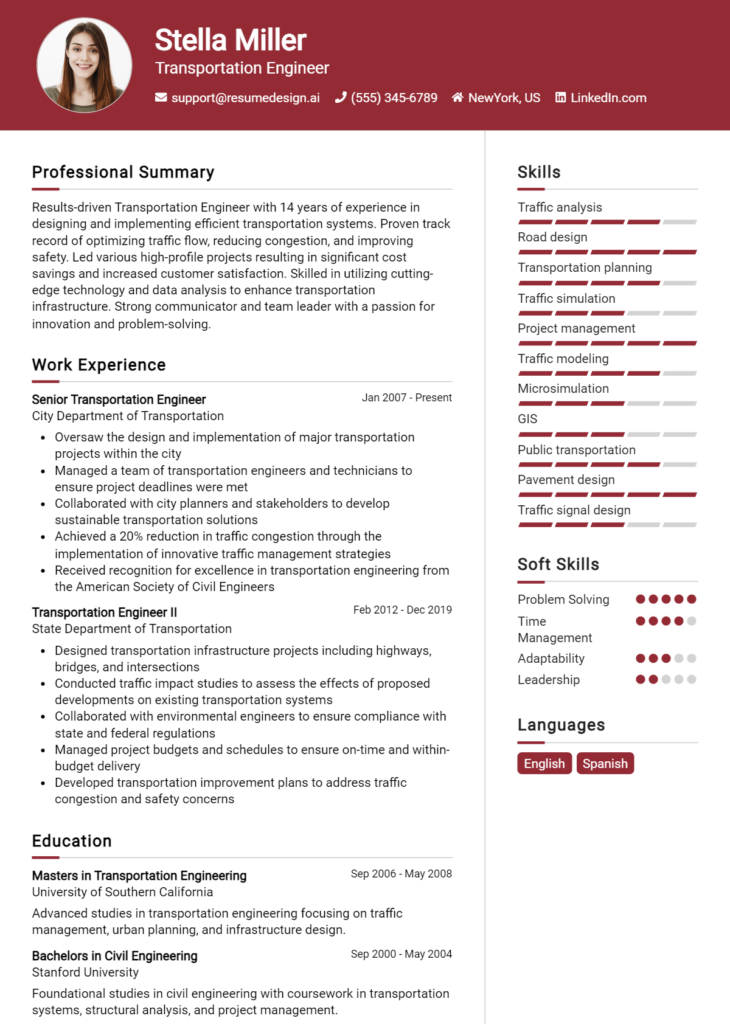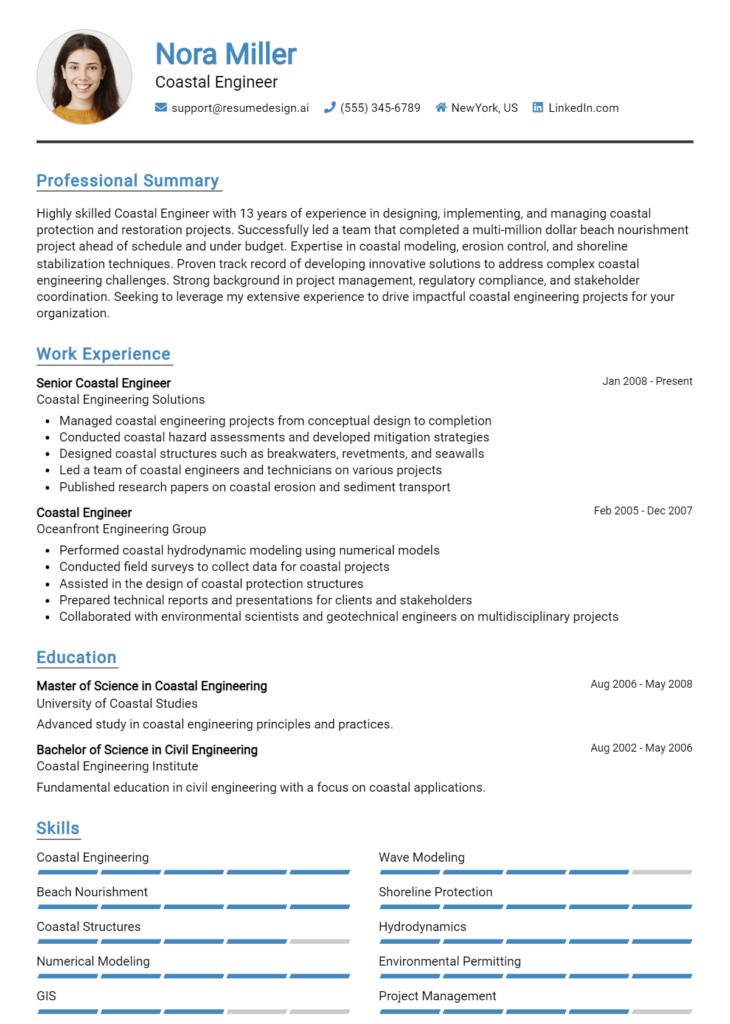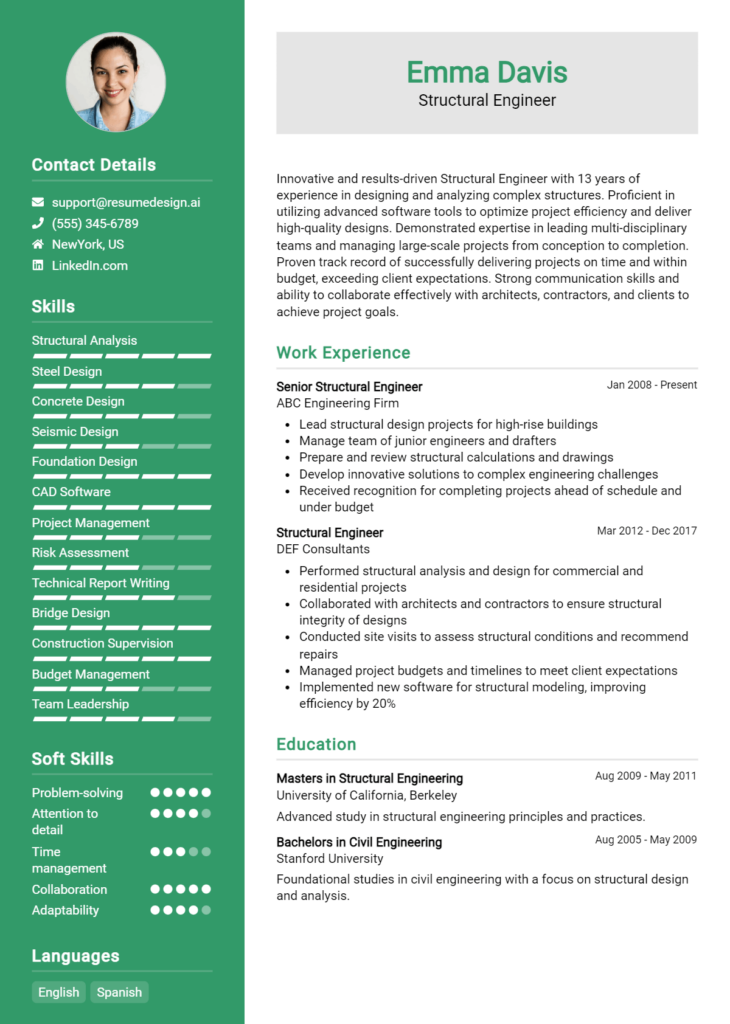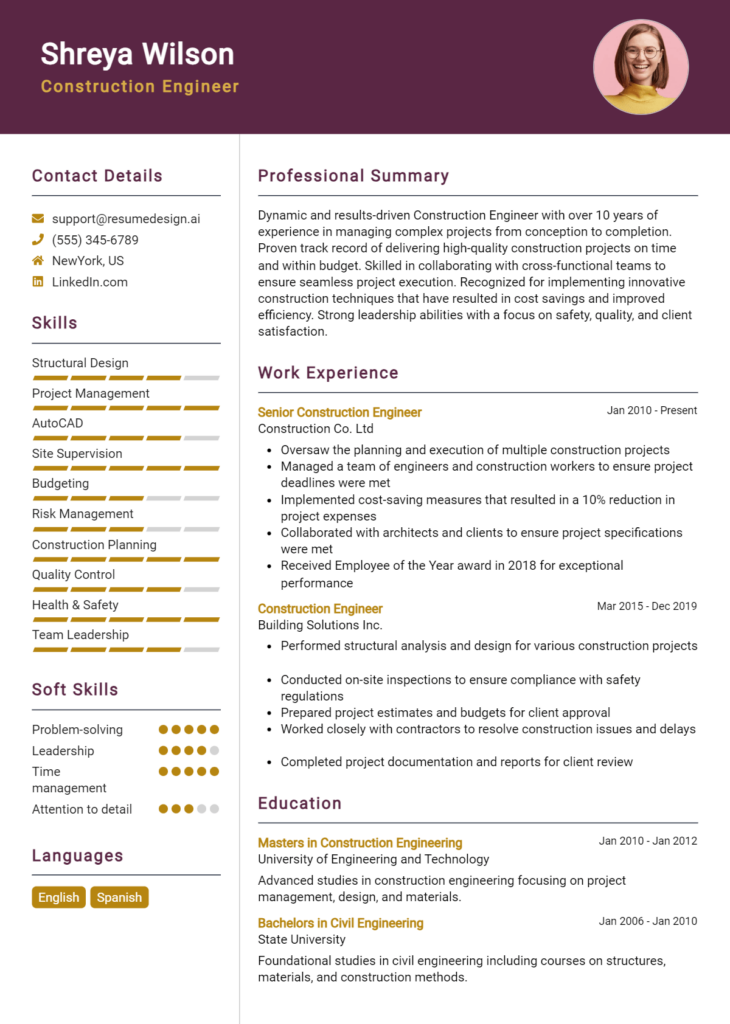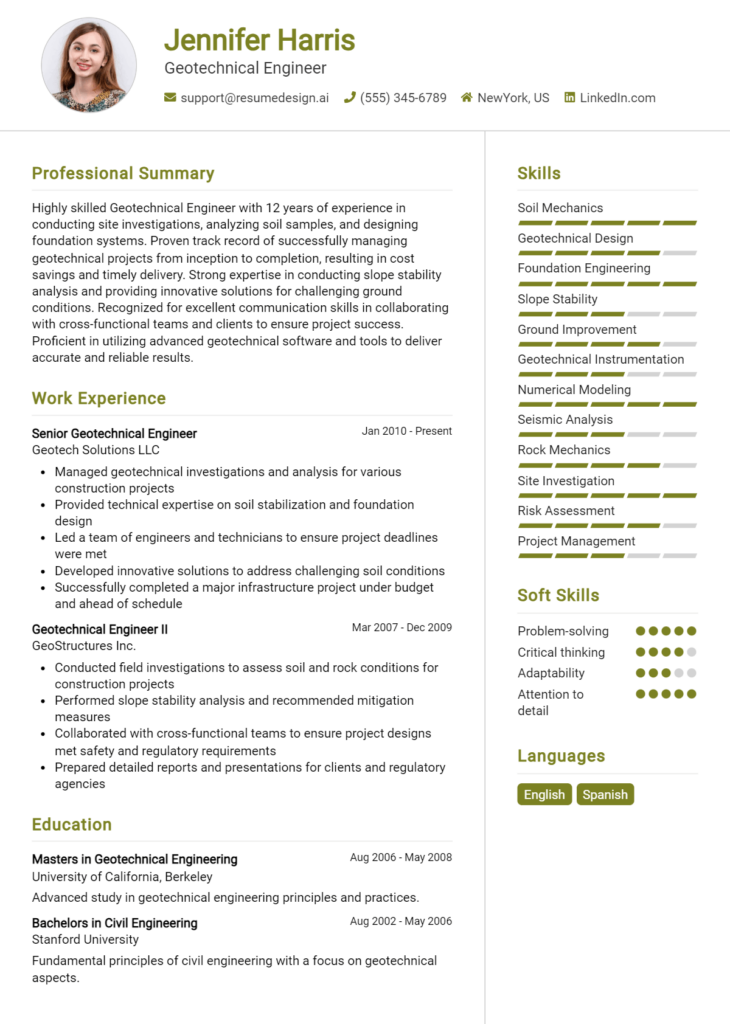Pavement Engineer Core Responsibilities
A Pavement Engineer plays a crucial role in the design, construction, and maintenance of roadways, ensuring safety and functionality. Key responsibilities include conducting soil and material tests, analyzing traffic patterns, and collaborating with project managers and construction teams. Essential skills encompass technical expertise in materials science, operational knowledge of construction processes, and strong problem-solving abilities to address challenges effectively. These competencies contribute significantly to an organization’s infrastructure goals, and a well-crafted resume can highlight these qualifications, showcasing the engineer’s impact on project success.
Common Responsibilities Listed on Pavement Engineer Resume
- Conduct detailed pavement condition assessments and evaluations.
- Design pavement structures using appropriate engineering software.
- Develop maintenance and rehabilitation plans for existing pavements.
- Coordinate with multidisciplinary teams during project development.
- Perform material tests to ensure compliance with specifications.
- Analyze traffic data to inform design and material selection.
- Prepare technical reports and documentation for projects.
- Monitor construction activities to ensure adherence to plans.
- Provide technical guidance to junior engineers and staff.
- Implement quality control processes during pavement construction.
- Evaluate environmental impacts of pavement materials and designs.
- Stay updated on industry trends and advancements in pavement technology.
High-Level Resume Tips for Pavement Engineer Professionals
A well-crafted resume is crucial for Pavement Engineer professionals, as it serves as the first impression a candidate makes on potential employers. In a competitive job market, your resume must effectively reflect your skills and achievements, showcasing your expertise in pavement design, construction, and maintenance. It’s not just a list of past jobs; it’s a marketing tool that should highlight your unique qualifications and how they align with the needs of the employer. This guide will provide practical and actionable resume tips tailored specifically for Pavement Engineer professionals, ensuring you stand out in your field.
Top Resume Tips for Pavement Engineer Professionals
- Tailor your resume to the job description by aligning your skills and experiences with the requirements listed in the job posting.
- Highlight relevant experience in pavement design, materials selection, and project management to showcase your expertise.
- Quantify your achievements with specific metrics, such as project budgets managed, percentage of on-time project completions, or improvements in pavement longevity.
- Incorporate industry-specific skills such as knowledge of pavement design software, understanding of materials science, and familiarity with local regulations.
- Use action verbs to describe your responsibilities and accomplishments, making your contributions clear and impactful.
- Include professional certifications and memberships related to pavement engineering, such as PE (Professional Engineer) or membership in the American Society of Civil Engineers (ASCE).
- Showcase your ability to collaborate with multidisciplinary teams, highlighting your communication and teamwork skills.
- Keep your resume concise and focused, ideally one page for early-career professionals and no more than two pages for those with extensive experience.
- Incorporate any relevant continuing education or training that enhances your qualifications, such as workshops on new pavement technologies.
By implementing these tips, you can significantly increase your chances of landing a job in the Pavement Engineer field. A well-structured resume that reflects your unique qualifications and aligns with employer expectations will help you stand out among other candidates, ultimately leading to more interview opportunities and career advancement.
Why Resume Headlines & Titles are Important for Pavement Engineer
In the competitive field of engineering, particularly for specialized roles such as Pavement Engineer, the importance of an impactful resume headline cannot be overstated. A well-crafted headline serves as the first impression for hiring managers, encapsulating a candidate's most relevant qualifications in a succinct manner. It acts as a beacon that draws attention, effectively summarizing the candidate's expertise, skills, and experiences tailored for the specific job. A strong resume headline should be concise, relevant, and aligned directly with the position being applied for, ensuring that it resonates with the priorities of potential employers.
Best Practices for Crafting Resume Headlines for Pavement Engineer
- Keep it concise: Aim for one impactful phrase that summarizes your expertise.
- Be role-specific: Use terminology and keywords relevant to pavement engineering.
- Highlight key strengths: Focus on your most significant skills and achievements.
- Use action-oriented language: Start with strong verbs to convey your capabilities.
- Tailor your headline: Customize your headline for each job application to align with the job description.
- Avoid jargon: Use clear and straightforward language that can be easily understood.
- Incorporate numbers: Quantify your achievements when possible to add credibility.
- Reflect your career stage: Consider incorporating your level of experience, such as "Senior" or "Entry-Level."
Example Resume Headlines for Pavement Engineer
Strong Resume Headlines
Experienced Pavement Engineer Specializing in Sustainable Materials and Techniques
Innovative Pavement Engineering Professional with Over 10 Years of Project Management Experience
Results-Driven Pavement Engineer with Proven Expertise in Asphalt Design and Rehabilitation
Weak Resume Headlines
Engineer Looking for a Job
Pavement Engineer with Some Experience
Strong resume headlines are effective because they immediately communicate the candidate's relevant skills and experiences while also showcasing their unique value proposition. They provide a clear insight into what the candidate can bring to the role, thus piquing the interest of hiring managers. In contrast, weak headlines fail to impress due to their vagueness and lack of specificity, making it difficult for employers to discern the candidate's qualifications or differentiating factors. Such generic statements do not engage the reader and may lead to the candidate being overlooked in a sea of applicants.
Writing an Exceptional Pavement Engineer Resume Summary
A well-crafted resume summary is essential for a Pavement Engineer, as it serves as the first impression for hiring managers who often sift through numerous applications. A strong summary quickly grabs attention by highlighting key skills, relevant experience, and notable accomplishments that directly relate to the job role. It should be concise and impactful, tailored specifically to the position being applied for, ensuring that the candidate stands out in a competitive job market.
Best Practices for Writing a Pavement Engineer Resume Summary
- Quantify Achievements: Use numbers and percentages to demonstrate the impact of your work, such as project completions or cost savings.
- Focus on Key Skills: Highlight specific skills related to pavement engineering, such as materials analysis, project management, and design proficiency.
- Tailor to the Job Description: Customize your summary to reflect the specific requirements and keywords mentioned in the job listing.
- Be Concise: Aim for 2-4 sentences that encapsulate your expertise and contributions without being overly verbose.
- Use Action Verbs: Start sentences with strong action verbs to convey your achievements and responsibilities assertively.
- Highlight Relevant Experience: Mention years of experience in pavement engineering and relevant projects that showcase your capabilities.
- Showcase Certifications: Include any relevant certifications or licenses that enhance your qualifications for the role.
- Maintain Professional Tone: Keep your language formal and professional to reflect your expertise and seriousness about the position.
Example Pavement Engineer Resume Summaries
Strong Resume Summaries
Results-driven Pavement Engineer with over 8 years of experience in highway and urban roadway design, successfully managing projects that reduced material costs by 15% while improving durability. Proficient in utilizing software such as AutoCAD and Civil 3D to enhance design accuracy and efficiency.
Detail-oriented Pavement Engineer with a proven track record of overseeing the construction of over 50 miles of pavement, achieving a 98% compliance rate with quality standards. Skilled in conducting thorough site assessments and collaborating with cross-functional teams to ensure timely project delivery.
Innovative Pavement Engineer with expertise in sustainable materials and practices, leading initiatives that resulted in a 20% reduction in carbon footprint for multiple projects. Adept at leveraging advanced modeling techniques to enhance pavement performance and longevity.
Weak Resume Summaries
Experienced engineer looking for a position in pavement engineering. I have worked on various projects and am familiar with different materials.
Pavement Engineer with knowledge of engineering principles and construction. I am seeking a job where I can apply my skills and grow in the field.
The strong resume summaries effectively highlight quantifiable achievements and specific skills relevant to pavement engineering, making them impactful and tailored to the roles. In contrast, the weak summaries are vague, lack measurable outcomes, and fail to convey the candidate's capabilities, making them less appealing to hiring managers.
Work Experience Section for Pavement Engineer Resume
The work experience section of a Pavement Engineer resume is critical as it serves as a comprehensive showcase of the candidate's technical skills and capabilities in managing projects and teams. This section allows candidates to demonstrate their proficiency in pavement design, material selection, and construction practices, while also highlighting their ability to deliver high-quality products on time and within budget. By quantifying achievements, such as successful project completions or cost reductions, and aligning their experience with industry standards, candidates can significantly enhance their appeal to potential employers.
Best Practices for Pavement Engineer Work Experience
- Focus on technical skills relevant to pavement engineering, such as proficiency in design software and knowledge of materials.
- Quantify results by including specific metrics, such as project costs, timelines, and improvements in pavement performance.
- Highlight leadership experiences, detailing any roles managing teams or overseeing projects.
- Emphasize collaboration with other professionals, showcasing experiences in multidisciplinary teams.
- Use industry-standard terminology to align experiences with the expectations of hiring managers.
- Tailor your experiences to match the requirements of the job description you are applying for.
- Include any relevant certifications or training that enhance your qualifications as a Pavement Engineer.
- Keep the descriptions concise and focused, ensuring clarity in your achievements and responsibilities.
Example Work Experiences for Pavement Engineer
Strong Experiences
- Led a team of 5 engineers in the successful design and implementation of a $1.2M asphalt overlay project, resulting in a 30% increase in lifespan compared to previous pavements.
- Managed a $500K pavement rehabilitation project, completing it 2 weeks ahead of schedule and 15% under budget while improving roadway safety by 40%.
- Conducted materials testing and analysis for a large-scale urban development, leading to a 20% reduction in material costs through optimized material selection.
- Collaborated with city planners and environmental engineers to develop sustainable pavement solutions, decreasing project environmental impact by 25%.
Weak Experiences
- Worked on various pavement projects without specific roles or responsibilities mentioned.
- Assisted in materials testing but did not quantify any outcomes or improvements.
- Participated in team meetings and discussions without detailing contributions or results.
- Involved in project work that lacked measurable success or clear objectives.
The examples of strong experiences are considered effective because they provide specific accomplishments, demonstrate leadership roles, and quantify outcomes that showcase the candidate's impact on projects. In contrast, the weak experiences lack detail and measurable results, making it difficult for potential employers to assess the candidate's contributions and effectiveness in previous roles. Providing concrete examples and quantifiable achievements is essential in establishing a solid professional profile in the field of pavement engineering.
Education and Certifications Section for Pavement Engineer Resume
The education and certifications section of a Pavement Engineer resume is essential as it serves to underscore the candidate's academic qualifications and specialized training pertinent to the field. This section not only showcases the formal education obtained but also highlights industry-relevant certifications that demonstrate a commitment to professional development and continuous learning. By including relevant coursework, certifications, and specialized training, candidates can greatly enhance their credibility and better align themselves with the expectations of potential employers in the civil engineering sector.
Best Practices for Pavement Engineer Education and Certifications
- Include all relevant degrees, such as a Bachelor’s or Master’s in Civil Engineering or a related field.
- List industry-recognized certifications, such as the Professional Engineer (PE) license or the American Society of Civil Engineers (ASCE) certifications.
- Detail specific coursework that directly relates to pavement design, materials engineering, or transportation planning.
- Highlight any specialized training programs or workshops that pertain to pavement engineering.
- Use clear and concise language, avoiding jargon that may not be familiar to all hiring managers.
- Organize the section in reverse chronological order to emphasize the most recent and relevant qualifications.
- Consider including ongoing education or certifications in progress to demonstrate a commitment to professional growth.
- Avoid unnecessary details about high school education if more advanced degrees are held.
Example Education and Certifications for Pavement Engineer
Strong Examples
- Bachelor of Science in Civil Engineering, University of California, Berkeley, 2018
- Professional Engineer (PE) License, California Board for Professional Engineers, 2020
- Certificate in Pavement Design and Management, American Society of Civil Engineers, 2021
- Relevant Coursework: Asphalt Materials, Pavement Analysis, and Design, Traffic Engineering
Weak Examples
- Bachelor of Arts in English Literature, State University, 2015
- Certification in Project Management, Online Course Provider, 2019
- High School Diploma, Local High School, 2013
- Certificate in Basic Computer Skills, Community College, 2020
The strong examples are considered effective because they directly relate to the qualifications and skills required for a Pavement Engineer position, showcasing relevant degrees and certifications that demonstrate expertise in the field. In contrast, the weak examples lack relevance to pavement engineering and do not provide evidence of the candidate's specialized knowledge or qualifications, which could detract from their overall candidacy in a competitive job market.
Top Skills & Keywords for Pavement Engineer Resume
In the competitive landscape of civil engineering, particularly in the specialized field of pavement engineering, showcasing the right skills on your resume is crucial. Employers seek candidates who not only possess technical expertise but also demonstrate strong interpersonal abilities that facilitate collaboration and effective project management. A well-crafted resume that highlights both hard and soft skills can significantly enhance your chances of landing an interview. By emphasizing your relevant qualifications, you can illustrate your preparedness to tackle the challenges of pavement design, construction, and maintenance.
Top Hard & Soft Skills for Pavement Engineer
Soft Skills
- Communication
- Teamwork
- Problem-solving
- Time management
- Attention to detail
- Adaptability
- Leadership
- Critical thinking
- Conflict resolution
- Client relations
Hard Skills
- Pavement design methodologies
- Material science knowledge
- Geotechnical engineering principles
- Construction management
- Quality assurance and control
- Pavement evaluation techniques
- AutoCAD and other design software
- Project management tools (e.g., MS Project)
- Knowledge of local and federal regulations
- Data analysis and interpretation
For a comprehensive approach to building your resume, be sure to consider not only your skills but also your work experience, as these elements together will create a powerful impression on potential employers.
Stand Out with a Winning Pavement Engineer Cover Letter
Dear [Hiring Manager's Name],
I am writing to express my interest in the Pavement Engineer position at [Company Name], as advertised on [where you found the job listing]. With a strong background in civil engineering and specialized experience in pavement design and maintenance, I am excited about the opportunity to contribute to your team and help enhance transportation infrastructure. My hands-on experience with various pavement materials and technologies, coupled with my analytical skills, positions me as a strong candidate for this role.
In my previous role at [Previous Company Name], I successfully managed multiple pavement projects, from initial design through construction and maintenance phases. I utilized advanced software tools for pavement analysis and design, ensuring that all projects adhered to safety standards and met client specifications. My collaborative approach allowed me to work effectively with cross-functional teams, including contractors and municipal agencies, to deliver projects on time and within budget. I take pride in my ability to communicate complex technical information clearly, facilitating informed decision-making among stakeholders.
I am particularly drawn to the innovative projects at [Company Name] and your commitment to sustainable practices in pavement engineering. I am eager to bring my expertise in evaluating pavement performance and implementing solutions that optimize durability and minimize environmental impact. My dedication to continuous improvement and staying updated on industry trends will ensure that I contribute effectively to your mission of delivering high-quality infrastructure solutions.
Thank you for considering my application. I look forward to the opportunity to discuss how my skills and experiences align with the needs of your team. I am excited about the possibility of working at [Company Name] and contributing to the success of your projects.
Sincerely,
[Your Name]
[Your Phone Number]
[Your Email Address]
Common Mistakes to Avoid in a Pavement Engineer Resume
When crafting a resume for a Pavement Engineer position, it’s essential to present your qualifications and experience effectively. However, many candidates make common mistakes that can hinder their chances of landing an interview. Avoiding these pitfalls can significantly enhance the impact of your resume, allowing your skills and expertise to shine through. Here are some common mistakes to watch out for:
Generic Objective Statement: Using a vague or generic objective can make your resume blend into the crowd. Tailor your objective to align with the specific position and company you are applying to.
Neglecting Technical Skills: Failing to highlight relevant technical skills, such as proficiency in pavement design software or knowledge of material specifications, can lead to missed opportunities. Clearly list these skills to demonstrate your qualifications.
Lack of Quantifiable Achievements: Simply stating responsibilities without providing quantifiable outcomes can weaken your resume. Use metrics to showcase your contributions, such as "improved pavement durability by 20% through innovative design techniques."
Ignoring Keywords from the Job Description: Not incorporating keywords and phrases from the job description can result in your resume being overlooked by applicant tracking systems. Pay attention to key terms and include them where appropriate.
Inconsistent Formatting: A resume that lacks consistent formatting can be visually unappealing and difficult to read. Use uniform fonts, headings, and bullet points to create a polished and professional appearance.
Overloading with Irrelevant Information: Including excessive details about unrelated work experience can distract from your main qualifications. Focus on relevant roles and experiences that directly relate to pavement engineering.
Missing Certifications or Licenses: Omitting important certifications, such as a Professional Engineer (PE) license or relevant training, can be detrimental. Ensure these credentials are prominently displayed on your resume.
Poor Spelling and Grammar: Errors in spelling and grammar can convey a lack of attention to detail, which is critical in engineering roles. Proofread your resume multiple times and consider having someone else review it for potential mistakes.
Conclusion
As a Pavement Engineer, your role is pivotal in ensuring the durability and safety of roadways and pavement structures. Throughout this article, we have explored the essential skills and qualifications required for this profession, including an understanding of material properties, soil mechanics, and pavement design methodologies. We also highlighted the importance of staying updated with the latest industry standards and technologies to enhance project outcomes.
Additionally, we discussed the significance of effective communication and collaboration with other engineering disciplines, as well as stakeholders involved in the design and construction processes. Your ability to analyze data and develop innovative solutions is critical in addressing the challenges faced in pavement engineering.
In conclusion, as you reflect on your career as a Pavement Engineer, it’s crucial to ensure that your resume accurately showcases your skills, experiences, and achievements in this specialized field. Don’t miss the opportunity to make a strong impression on potential employers.
Take action today by reviewing your Pavement Engineer Resume and utilizing available resources to enhance it. Explore our resume templates, use the resume builder for a professional layout, check out resume examples for inspiration, and craft a compelling introduction with our cover letter templates. Your next career opportunity could be just around the corner!

